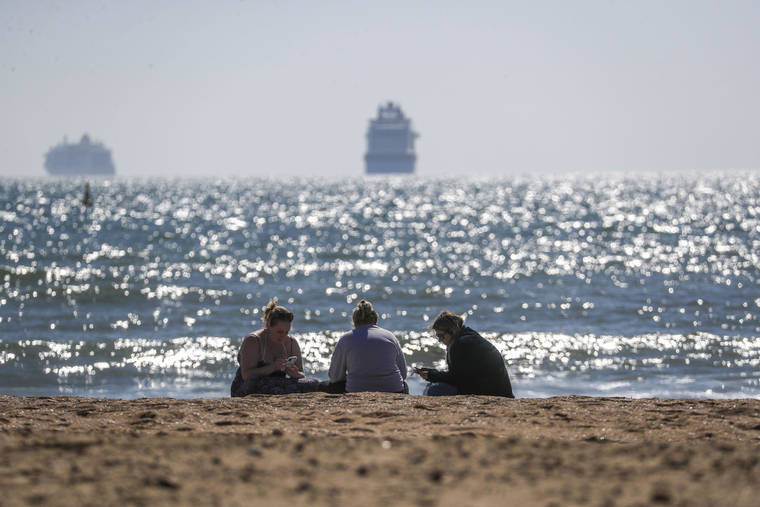LONDON — It’s been dubbed Happy Monday — the day people could put on a bathing suit and swim in an outdoor pool for the first time in months, or rusty golfers strove to hit their drives down the middle of the fairway.
Following a near three-month coronavirus lockdown that along with a rapid rollout of vaccines has seen infections fall dramatically, England embarked on a major easing of restrictions with families and friends able to meet up in outdoor spaces and many sports permitted once again. The other parts of the U.K. — Scotland, Wales and Northern Ireland — are taking broadly similar steps.
And, as if right on cue, the weather is improving, with temperatures rising to levels more akin to southern Spain at this time of year.
Under Monday’s easing, groups of up to six, or two households, can socialize in parks and gardens once more, while outdoor sports facilities can reopen.
“It’s only because of months of sacrifice and effort that we can take this small step towards freedom today and we must proceed with caution,” Prime Minister Boris Johnson said at a media briefing.
Johnson said it’s “inevitable” that cases would start to rise again in coming weeks as Europe struggles with a resurgence of the virus. However, he urged everyone to follow the rules and to get a vaccine jab when called.
Though many aspects of everyday life remain off-limits for at least a few more weeks, many people are relishing their new freedoms, such as playing their outdoor sport of choice, provided the numbers involved meet the limits set out. Organized team sports, such as children’s football clubs, can start up again too, up to any number.
One of the first — if not the first — to reopen Monday was the Morley Hayes Golf Club, near Derby in central England, with players teeing off at 12:01 a.m. for a seven-hole floodlit charity tournament.
Many aspects of England’s lockdown remain in place with the British government stressing that it’s taking a cautious approach to lifting the restrictions, not least because of rising cases in continental Europe. It says that upcoming plans to lift restrictions, such as allowing pubs to serve beer outside from April 12, could be delayed if the virus backdrop deteriorates.
“The whole point about the road map and the timescale that we have got is that it gives us a chance to evaluate the data as we go forward,” Johnson said.
Police stressed that officers will remain highly visible, including in open spaces, and won’t hesitate to fine anyone going beyond what is allowed, such as those gathering at house parties.
“We make no apology for our tough stance on shutting down those large gatherings which risk public safety,” said Deputy Assistant Commissioner Jane Connors, who leads the coronavirus response for London’s Metropolitan Police.
Most nonessential businesses remain closed, along with pubs, restaurants, gyms, cinemas, theaters, museums and sports stadiums. And the government continues to urge people to work at home where they can, while traveling abroad is banned except for a few special reasons.
Though new coronavirus cases and deaths are at their lowest levels in around six months, the U.K. has suffered Europe’s deadliest outbreaks, with more than 126,500 coronavirus-related deaths, according to government figures. Other measures put the death toll higher because in the early days of the pandemic a year ago, there was very little testing for the virus.
Families who lost loved ones have started painting a mural made up of almost 150,000 hand-drawn hearts on the south bank of the River Thames in London opposite the Houses of Parliament to remember those who have died. The mural is expected to stretch more than a half-mile (nearly a kilometer) when finished.
The “Covid-19 Bereaved Families For Justice” group, which is urging the government to call an inquiry into the handling of the pandemic, said the unlicensed mural isn’t meant to be “political or antagonistic” but instead provide a “visual representation” of every life lost.
“Like the scale of our collective loss, this memorial is going to be enormous,” said Matt Fowler, co-founder of the group, who lost his father to the virus.
Restrictions have been eased as official figures show more than 30 million people in the U.K. have received a first vaccine dose, accounting for about 57% of all adults. The U.K. has been rolling out vaccines by age group — those 50 and above have been able to get a first shot — and is aiming to give everyone over the age of 18 a first jab by July.
Because of supply constraints, the rollout of first doses to those under 50 is being paused during April, with the focus primarily on delivering second shots to those deemed the most vulnerable.
“We continue to fortify the population, roll out the vaccine at the speed that we are,” Johnson said.
———
Follow AP’s pandemic coverage at:
https://apnews.com/hub/coronavirus-pandemic
https://apnews.com/hub/coronavirus-vaccine
https://apnews.com/UnderstandingtheOutbreak


